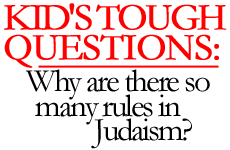 Iran’s Attack on Israel
Iran’s Attack on Israel


4 min read
What's wrong with having some fun?
A. This is a very difficult question to respond to with words alone. In fact, words may sound apologetic, even empty.
What I mean to say is that the answer, to have greater meaning, must be lived and experienced. When responding to this question, try not to be defensive or judgmental. This is a good question, it shows that your child is thinking, and your stance should reflect this sentiment.
First of all, take the question seriously, and resist any possible feeling of anger at the way it might be phrased.
Second, it is essential to talk about the importance of fun in Judaism in your answer. Fun is not wrong, as long as it is safe -- safe to the body and safe to the spirit. In fact, it is a commandment to have fun, to laugh, to let go -- to bring happiness into one's life.
Third, validate your child's feelings and empathize that you could see how he or she might feel this way. You may want to share some of your own questions on this matter, perhaps how you, too, may have wondered at one time why there are so many "no's" in our tradition.
Fourth, begin a discussion about the different types of fun. The fun that is healthy and the fun that is not. For example, drugs may be fun, but are not OK. (A longer talk about drugs another time.) The fun that is constructive and the fun that is destructive. The fun that brings friends closer and the fun that pushes some away. (As in, it's not funny to "make fun" of others.) And the fun that makes one feel good about him/herself and the fun that fills one with shame.
There is the fun that makes one feel good about him/herself and the fun that fills one with shame.
Our Torah also distinguishes between fun that enhances one's spirit or is at least not detrimental, and the fun that can do damage to one's spirit, one's spiritual sensitivity to holiness, and one's connection go God. The negative commandments in the Torah are all protective in the sense that God as Creator, as the Being Who knows each of us intimately, and Who understands the properties of all of creation, instructs us and directs us towards activities that are life and spirit enhancing.
This is not dissimilar to a parent who tells his or her child that while cigarettes may be fun to smoke, they're harmful and not acceptable. Or to a parent who responsibly teaches her child about the dangers of appetizing, but poisonous mushrooms. Appearances are deceiving and God knows the true substance.
Fifth, and perhaps most important for the development of your child, is for you to begin to articulate in some way the profound differences between fun and joy.
Fun and joy may look alike and may therefore be confused, but fun can be the counterfeit of joy. This is not about denigrating fun, but rather to help your child become aware of, and express what he/she knows to be true at an instinctual level, that the search for joy is not satisfied by fun.
Many a child or adolescent has said to me, "We don't always have to do something, I just want my family to sit together and get along." Children yearn for the inner feeling of peace and security when Mom and Dad smile at each other, for pleasant family time, for the self-pride that comes from accomplishment, for feeling loved and approved of. And all these are elements of happiness and joy.
Viktor Frankl, author of the famed "Man's Search for Meaning," has written extensively that true joy is a byproduct of living meaningfully, making an impact, acting for something bigger than oneself. It is the feeling that one has when he/she looks in the mirror at the end of the day and likes what he/she sees there.
Viktor Frankl has written extensively that true joy is a byproduct of living meaningfully.
Fun is Saturday night, joy is Friday night -- the Friday night of Shabbat. It is the joy of a family sitting down together to eat and sing. It is a joy of quiet, of inner reflection, and of human-divine intimacy.
Fun is external and fleeting, joy is inward and lasting. And more than this -- fun, especially the drive for fun at all costs, is often in the interest of avoiding inner pain. Joy is often the result of facing pain, and making it through to the other side. Lastly, fun is a day at an amusement park (sometimes), joy is looking into the eyes of a person you love.
